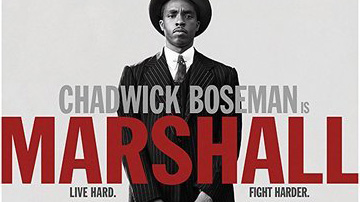Marshall: A Film The Academy Can’t Ignore

With some major releases this fall, including IT, Bladerunner 2049, and the new Kingsman film, there has been more than enough excitement in the movie world. However, this has also caused a few stellar films to slip through the cracks without being detected by the vast amount of moviegoers.
A perfect example of this is Marshall, a film depicting a young Thurgood Marshall, before he became the first African-American in the Supreme Court, and was instead a leading Lawyer for the NAACP. A true film masterpiece was created with this picture, giving us powerful acting, intricate styles, and a story that needed to be told.
The year is 1941, and Thurgood Marshall has been called to defend a black man in conservative Connecticut who has been accused of raping a white woman. Marshall must team up with a Jewish civil suits lawyer named Sam Friedman to defend him, despite a racially discriminatory judge who refuses to let Marshall verbalize in court and may only write in his opinions.
Throughout the film Marshall and Friedman are tormented by the citizens of the town for their attempts to help save a black man who, in the eyes of the people, was most definitely guilty. Marshall and Friedman fight to find the truth and prove their man innocent in a corrupt society that has it out for both their client and them.
This film brings the historical context of a discriminatory town in the 1940s to life, from scenes of protesters screaming racial slurs in Marshall’s face to Friedmen being jumped by a group of white supremacists, everything feels raw, painful, and real.
This film brings a very unique style to their film, adding flashbacks of scenes claimed by witnesses in the cases in fogged or blurred lenses, while when the truth is finally outed, the flashback becomes clear and in high definition for the audience to see. The film brings an amazing cast together, with rising star Chadwick Boseman as Thurgood Marshall headlining the group.
Boseman has made a niche for himself taking on roles as legendary African Americans of the 20th century, with previous credits as Jackie Robinson in 42, and James Brown in Get on Up. Boseman gives a performance that blows any competition out of the water, with a portrayal of Thurgood Marshall not as a legend, but as a man. Complimenting him was career funny-man Josh Gad, who takes a more serious tone with this film, playing the reluctant lawyer Sam Friedman. Gad compliments Boseman’s pure film charisma with his awkward yet passionate performance as a man who is trying to figure out where he stands on the line between what’s right and what will benefit him.
These two are the focal point of the film, and both give performances that would not be easily replicated. Boseman in particular should find himself in conversations for the Best Actor in a Lead Role this year at The Oscars. Sterling K. Brown takes on the role of Joseph Spell, an African American man accused of a crime he did not commit, and brings us to the edge of our seats with his raw emotion. Brown brings out the waterworks in the audience with his silent agony while watching his life be argued by lawyers right in front of his eyes. His performance is next to perfection, and it would not be at all surprising if there is discussion of his name when Oscars nominations come out.
Overall, this film is truly amazing. A story about an American legend without giving them sanctification for their future accomplishments is something that many historical films struggle with, but this film dodges that bullet with ease, making Marshall just another normal human being who is fighting for what is right.
Camera work and powerful shots give this film an enthralling energy that cannot be ignored. This film should not only be recognized as one of the best of the year, but it is a film that, in spite of recent issues with diverse nominations, the Academy cannot ignore when award season comes around. It is a must-see film that people from all walks of life should see.








